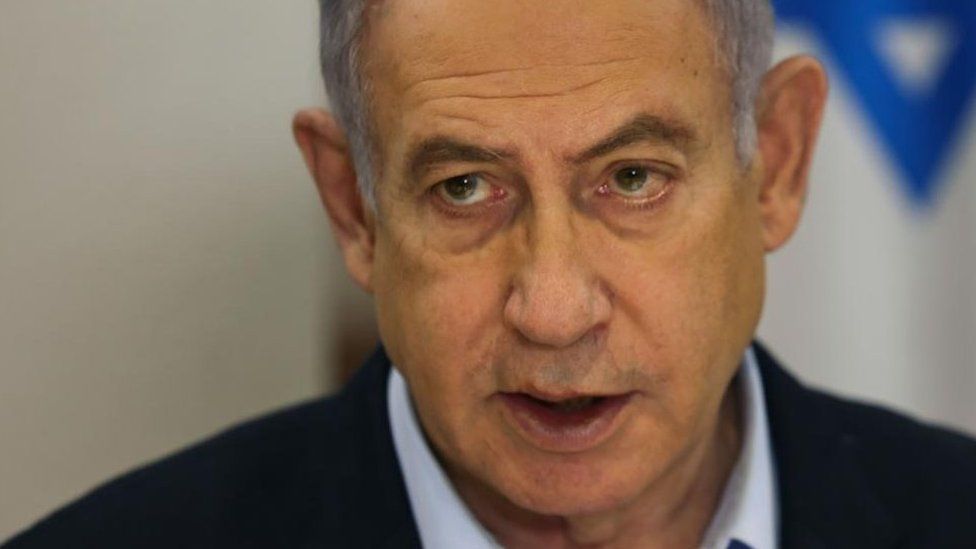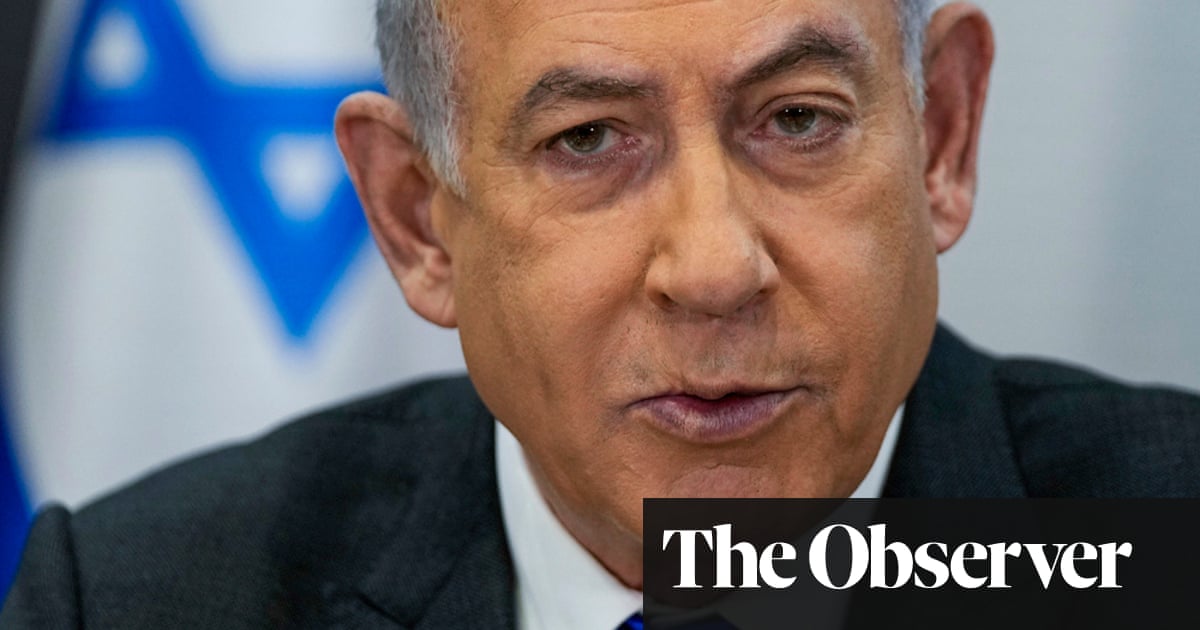#News #Times #NewsAndTimes #NT #TNT #Israel #World #USA #POTUS #DOJ #FBI #CIA #DIA #ODNI #Mossad #Netanyahu #Putin #Russia #GRU #Ukraine #SouthCaucasus #NewAbwehr #Bloggers #PoliticalPersonology #PoliticalCriminology #Counterintelligence… https://t.co/i5UAryRrM5
Day: January 21, 2024
Tweets

A meta-analysis of behavioral studies questions a strange phenomenon: What makes people shut their eyes to the truth – in Gaza, for example?https://t.co/2HT8eZYjNq
— Haaretz.com (@haaretzcom) January 20, 2024

לא אתפשר על שליטה ביטחונית ישראלית מלאה על כל השטח ממערב לירדן – וזה מנוגד למדינה פלסטינית.
— Benjamin Netanyahu – בנימין נתניהו (@netanyahu) January 20, 2024

Israel’s Prime Minister Benjamin Netanyahu has again rejected the idea of creating a Palestinian state.
His comments came hours after a phone call with US President Joe Biden after which the US leader indicated Mr Netanyahu may still accept the idea.
Mr Netanyahu’s remarks appeared to deepen a public divide with the US.
The US believes a Palestinian state alongside Israel – known as a “two-state solution” – is vital for long-term stability.
But the White House acknowledged this week the US and Israeli governments “clearly see things differently”.
Speaking to reporters after the two leaders held a call for the first time in almost a month, Mr Biden insisted a two-state solution was still possible with Mr Netanyahu in office.
“There are a number of types of two-state solutions. There’s a number of countries that are members of the UN that… don’t have their own militaries,” he said.
But on Saturday Mr Netanyahu doubled down on his position, which he has held for much of his political career and repeated earlier this week.
A statement released by his office read: “In his conversation with President Biden, Prime Minister Netanyahu reiterated his policy that after Hamas is destroyed Israel must retain security control over Gaza to ensure that Gaza will no longer pose a threat to Israel, a requirement that contradicts the demand for Palestinian sovereignty.”
Also on Saturday, in a post on X – formerly Twitter – he said Israel must retain “security control over the entire area west of [River] Jordan”, an area which also encompasses the Israeli-occupied West Bank territory.
The comments will dampen hopes in some circles that the Gaza crisis could result in Israeli and Palestinian leaders restarting diplomatic negotiations and kickstarting the dormant peace process.
Mr Netanyahu’s increasing isolation abroad comes amid continuing support for the war at home, coupled with protests over the fate of the estimated 130 hostages still being held inside Gaza by Hamas.
Hamas killed about 1,300 people – mostly civilians – and took 240 hostages in their surprise attack on southern Israel on 7 October.
Thousands of protesters, including relatives of those still missing, gathered in Tel Aviv on Saturday, urging Mr Netanyahu to reach a truce to allow the hostages home.
Gil Dickmann, whose cousin was captured on 7 October, said: “Dear Prime Minister Benjamin Netanyahu, we believe that you can bring them back. We believe in you.
“We know that you can sign this deal and bring about this victory to all the citizens of Israel. Just do it, Bibi. Just do it. Bring the hostages back home.”
Israeli forces have continued to push into southern Gaza, saying they are searching for top Hamas officials they believe are hiding in Khan Younis, the Strip’s second biggest city.
The Israel Defense Forces said they had raided a tunnel in Khan Younis that had been used to hold hostages, although they were not there when it was discovered.
While the focus of the fighting is now in southern Gaza, there have been renewed clashes around the northern town of Jabalia, as Palestinian fighters reportedly advanced while Israel tried to move its soldiers and tanks south.
Almost three months since Israel launched its ground invasion of Gaza, its army – vastly superior to Hamas in strength and equipment – is still facing significant resistance across the territory.
The Hamas-run health ministry in Gaza said on Sunday that 25,105 people had been killed in the territory since 7 October. More than 60,000 had also been injured, it said.

It was plain long before the 7 October attacks that Israel badly needed a change of leadership. That need is now urgent. The prime minister, Benjamin Netanyahu, should have resigned over the security failures surrounding the Hamas massacre, when about 1,200 Israelis were murdered. Instead, he has blamed others. Netanyahu argued the crisis required him to stay and lead a war to destroy the terrorists. He has repeatedly promised “total victory” and the freeing of Israeli hostages. But he has repeatedly failed to deliver.
The ongoing violence is unprecedented, Hamas is undefeated, many innocents remain in captivity, and government and country are split over tactics and a long-term settlement. Netanyahu must go.
The invasion and occupation of Gaza, launched in late October, is turning into a disaster for Israel. It already is a disaster for Palestinians, nearly 25,000 of whom have been killed, according to local health ministry figures. The UN warned last week that 2.2 million people face famine conditions, exacerbated by Israel’s unceasing attacks and obstruction of humanitarian aid. Most homes in the north are uninhabitable. Gaza is now termed the most dangerous place on Earth for children. Such misery is indescribable and a reproach to all.
The disaster engulfing Israel has unfolded more slowly following the immediate shock of 7 October – but, in many ways, is no less existential. The public no longer feels safe, President Isaac Herzog admits. Confidence in the country’s political leadership, already low, and its security forces and intelligence agencies has been severely shaken. Netanyahu’s “total war” in Gaza has stoked conflict in the occupied West Bank, with Hezbollah in Lebanon and the Houthis in Yemen. Israel now faces a multi-arena struggle that may last for months and result in many more deaths.
Netanyahu’s war has set back the Abraham accords normalisation process between Israel and Gulf Arab states. It has isolated the country internationally to an extraordinary degree, judging by recent votes at the UN general assembly. Israel stands accused in the Hague of committing acts of genocide, which it denies. Relations with friendly European countries, whose impassioned calls for a humanitarian ceasefire in Gaza it rejects, are badly strained. Significantly, Netanyahu is now in open dispute with the US, Israel’s most important ally, aid provider and arms supplier.
It is plain to almost everyone that his reliance on far right extremist ministers is distorting sensible decision-making
Many Israelis are appalled by Netanyahu’s selfish, destructive behaviour. Internal pressure for a change of prime minister and a change in Israel’s war and post-war strategies is building rapidly. Opinion polls suggest the public no longer trusts Netanyahu and wants him gone. The standing of his Likud party has plunged, too. It is plain to almost everyone that the prime minister’s reliance on far right extremist ministers to hold his coalition together is distorting sensible decision-making. Opposition parties are clamouring for early elections.
This necessary and overdue domestic debate reached a new level of intensity last week following a dramatic intervention by Gadi Eisenkot, an observer member of the war cabinet and former army chief of staff. Eisenkot said the release of the remaining hostages must be the immediate priority, and for this to happen a ceasefire was required. He accused Netanyahu of misleading Israelis by claiming Hamas could be eliminated. Urgent attention should be paid to the shape of a post-war political settlement, he said.
Ehud Barak, a former Labour prime minister, noted the US had presented Netanyahu with a post-war plan but had hit a brick wall. Under the proposal, an “inter-Arab force” would oversee security in Gaza under the auspices of a “revitalised” Palestinian Authority, whose right to govern would be recognised internationally. Rebuilding would be underwritten by Saudi Arabia and the UAE. “The American proposal is the only practical blueprint; in exchange, Israel will have to take part in future talks toward a two-state solution,” Barak wrote.
Without such a solution – meaning establishment of a sovereign, independent Palestinian state existing alongside Israel – there would be no long-term peace and security, Barak said. “In the absence of a realistic goal, we will end up mired in the Gaza quagmire, fighting simultaneously in Lebanon and in the West Bank, eroding the American backing and endangering the Abraham accords and the peace agreements with Egypt and with Jordan… One can argue the US proposal is bad; one cannot keep it from being discussed.”
This is the nub of the matter. The US supports a two-state solution in principle. Its final shape remains up for discussion. So, too, do the Palestinians and most other countries. It is, by general agreement, the best available route forward. Yet, at this critical moment, what did Netanyahu do? Deliberately, and with a large dose of self-interested political calculation, he chose last week to explicitly restate his unyielding opposition. “In any arrangement in the foreseeable future… Israel must have security control over all the territory west of the Jordan,” he said. A sovereign Palestine was not an option. It would never happen.
Perhaps Netanyahu genuinely believes a two-state solution could not work. Perhaps he hopes, by adopting a hardline stance, he can persuade Israelis that he, despite leading them into disaster, is still their best hope of future security. Perhaps he thinks this will save his job until a second Trump presidency comes to his rescue. He’s wrong on all counts. Netanyahu is no partner for peace. He is its enemy. Now is the moment for the Biden administration, Britain and all of Israel’s friends to tell him to get out of the way. Now is the moment for Israelis to throw him out.
